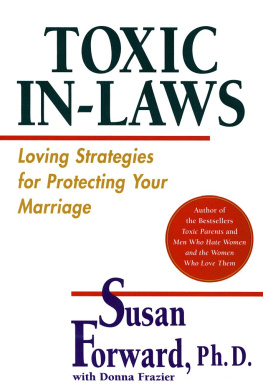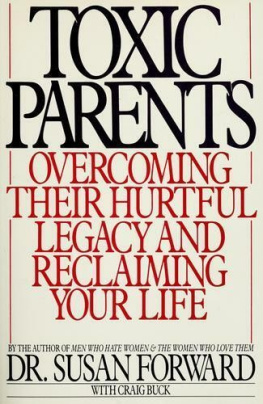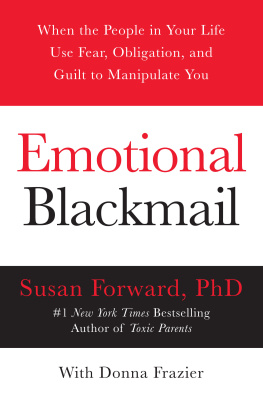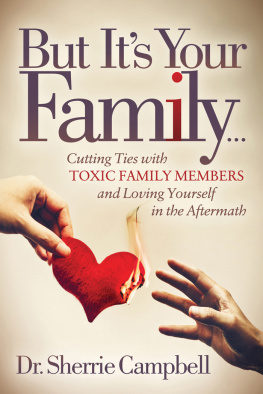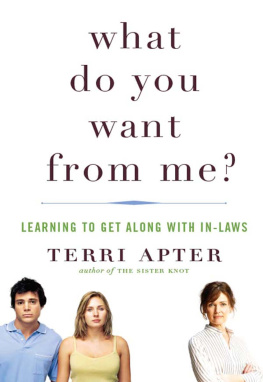TOXIC
IN-LAWS

Loving Strategies
for Protecting
Your Marriage

Susan Forward, Ph.D.
with Donna Frazier

Contents
In the idyllic days of courtship, you feel like youve reinvented love and youre about to create the kind of family you always wanted. Thats the powerful vision that pulls us into marriage.
Early on its easy to minimize the complex mlange of philosophical, religious, social, cultural, intellectual, and purely quirky differences that exist between you. Soon enough, though, there are holidays to be celebrated, rooms decorated, toothpaste tubes squeezed, investments madeand the differences that reveal themselves can test even the strongest relationship. The pushes and pulls that are part of every marriage would be stressful enough if the two of you had no one to deal with but each other. But the bewildering, scary, and often painful truth is that we dont marry just one person. We come into marriage with our own unique history, needs, and set ways of doing things, and we marry into a family with its own store of emotional baggage and tribal customs. We now have a mate. And, in most cases, we now have in-laws.
NOT ALL IN-LAWS ARE A PROBLEM
Some in-laws are really great, despite all the jokes and complaints. I know people with the good fortune to have wonderful in-laws, and I hope there is a special place in heaven for those parents who treat the new member of their family with affection and respectfeelings that deepen and enrich over time. I know several people who adore their in-laws, and several others who find their relationships with them more fulfilling than the ones they had with their own parents. I know others, who have in-laws that are real stinkers, but are protected by partners who keep the situation manageable by setting appropriate limits on their parents behavior. Theyre lucky. But vast numbers of others have discovered that their in-laws are a serious source of conflict and friction in their marriage and their life.
This book is a vital guide for those of you who have discovered, or fear, that the very fabric of your marriage is being eroded and threatened by the resentment, frustration, anger, guilt, and hopelessness that your relationship with your in-laws creates. Faced with their criticism, coldness, or attempts to interfere in your life, you may wind up in sniping battles, or find yourself smoldering, yelling at your partner, or crying after every encounter. Or, perhaps, youve tried to smooth things over, smile, make nice, and pretend everything is fine. Out of love for your partner and a desire to not rock the boat, maybe you go along to get alongonly to realize that you are repeatedly compromising your feelings, your beliefs, your desires, and, ultimately, some of your personal integrity.
Theres no question that in-law problems grind you down. But, more fundamentally, they work directly to weaken the bonds that connect you and your partnerand the longer they go unaddressed or are allowed to escalate, the more damaging they become. In my more than twenty-five years of counseling both individuals and couples of all ages and types, one indisputable fact has emerged true and clear: When you have in-law problems, you have marriage problems. Thats the bad news. The good news is that once you understand the complex system that connects you, your partner, and your in-laws, there are wonderfully empowering and effective things you can do to make the situation betterfor yourself, for your partner, and for your life together.
WHO ARE TOXIC IN-LAWS?
First, lets define our terms.
In my book Toxic Parents, I wrote that I chose the word toxic with great care. I know how provocative the word is, but I was, and still am, convinced it is the best word for describing the erosive and poisonous effect that certain people in our lives can have on us. And as you will see throughout this book, toxic in-laws honed their skills as toxic parents.
Toxic in-laws are more than just occasionally annoying or difficult. They are more than people who dont meet your dreams of how in-laws should be. You may find your in-laws taste to be tacky, or their politics unpleasant. You may squirm around them because you feel you have so little in common. But discomfort and social awkwardness alone dont mean youve got toxic in-laws.
Toxic in-laws are people who, through various types of assaults on you and your marriage, create genuine chaos. These assaults can be open and aggressive or subtle and subversive. They may range from attempts to control you through guilt-peddling or the use of money, to hurtful rejection of you because of religious or cultural differences. They are usually unapologetic and often unrelenting.
Please note that when I use the term toxic in-laws, I am referring specifically to your partners parent or parents. I know that many of you may have great difficulties with other in-laws as wellan obnoxious brother-in-law or a backbiting sister-in-law, but there is a unique power imbalance built into the adult-to-adult-child relationship. The older generation is invested by culture and society with both authority and an expectation of respect, whether they have earned it or not. Also, because they are, in most cases, from the same generation as your own parents, they often activate many of your unresolved parental conflicts.
DO YOU HAVE TOXIC IN-LAWS?
To pinpoint toxic in-laws, its helpful to look at two areas: (1) conditions in your in-laws own lives that make them more likely to interfere in your marriage, and (2) actual evidence of harmful intrusions. The following checklist can help you identify trouble spots:
Do Your In-Laws:
Have a cold or volatile relationship with each other?
Fight a great deal?
Drink excessively or abuse drugs?
If widowed or divorced, resist making a new life for themselves and expect your partner to be a surrogate spouse?
Regularly turn to your partner to meet their needs?
Regularly set up situations in which your partner is forced to choose between your needs and theirs?
Regularly criticize one or both of you?
Make derogatory comments about your appearance, work, political or religious beliefs, or things and people that are important to you?
Bribe you and your partner to get what they want?
Consistently try to make you and/or your partner feel guilty if you say no to them?
Constantly give unsolicited advice?
If youve answered yes to even one of the first three questions, your in-laws are highly likely to play out their personal problems in your marriage. One or two yeses on items four through eleven indicate that you already have problems with your in-laws that need some attention. And if youve answered yes to three or more of those questions, you have toxic in-laws who assume they have the right to control major areas of your life.
As obvious as their problem behavior is, your in-laws may be totally unaware of its impact on you. Sometimes their actions simply reflect the way they are and have always been. And quite often, those actions are invisible to your in-laws because no one has ever let them know how much unhappiness they are causing.
Next page
